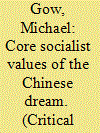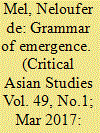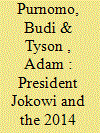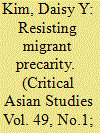|
|
|
Sort Order |
|
|
|
Items / Page
|
|
|
|
|
|
|
| Srl | Item |
| 1 |
ID:
151735


|
|
|
|
|
| Summary/Abstract |
This article analyzes the Chinese Communist Party’s “Core Socialist Values” (shèhuì zhŭyì héxīn jiàzhíguān) to show how each of these twelve values is defined, both independently and in relation to others. Using a Gramscian analytical approach, the article examines how a Chinese “integral state” is being prepared to ensure that consensus to the state’s proscribed values is not undermined by competing discourses. Consideration is given to how civil society becomes the ground for building consensus, reinforced by coercive strategies emanating from the Chinese state. In conclusion, the paper argues that the Core Socialist Values campaign represents a shift in focus under the current Xi Jinping Administration to emphasize the superstructure over the economic base, with the objective of creating citizens of and for the People’s Republic of China.
|
|
|
|
|
|
|
|
|
|
|
|
|
|
|
|
| 2 |
ID:
151731


|
|
|
|
|
| Summary/Abstract |
This article examines transnational family development by drawing on the findings of longitudinal research on bi-national marriages between Japanese women and Pakistani men. This type of marriage increased in Japan during the 1990s after a surge in male labor migrants from Pakistan. Very little attention has been given to bi-national relationships between women of the global North and men from the global South. This article explores the ways in which gender, nationality, and other factors intersect in the creation of transnational families. More specifically, it focuses on transnationally split family dynamics in which Japanese wives relocate to Pakistan with their children while their Pakistani husbands remain in Japan to work. These transnational strategies bring the families various opportunities in terms of economic advancement, children’s education, and the provision of care for the elderly. However, they also encounter various challenges as their life-courses unfold. Thus, this article highlights both the possibilities and limitations of these transnational families and shows how these Japanese women contest and negotiate their roles and positions within transnational households.
|
|
|
|
|
|
|
|
|
|
|
|
|
|
|
|
| 3 |
ID:
151734


|
|
|
|
|
| Summary/Abstract |
This essay studies the impact of the 2004 Asian Tsunami on a marginalized ethnic community of Burghers in Batticaloa, Eastern Sri Lanka. Through a case study of the displacement and re-settlement of Burgher women, their role in a cooperative society, and property ownership strategies, the essay argues that while gender positions may not have altered significantly at the macro level, changes have occurred at a micro-political level, and that these “small changes from below” mark the emergence of the women as a political community. It also points to the need, if these transformative practices are to be deepened and sustained, for developmental actors such as the state and international donors to recalibrate their approaches to rural women. This includes placing greater value on local social practices such as matrilineal inheritance that favor women in Eastern Sri Lanka.
|
|
|
|
|
|
|
|
|
|
|
|
|
|
|
|
| 4 |
ID:
151736


|
|
|
|
|
| Summary/Abstract |
During the 2014 presidential election in Indonesia two diametrically opposed candidates appeared to abide by an informal set of rules whereby neither challenged the other’s integrity in public. Privately, however, campaign advisors devised ways to attack their opponents, primarily by using media contacts to spread rumors and allegations. As a result, the 2014 presidential race in the world’s third largest democracy was the most negative and polarizing since the fall of Suharto’s authoritarian regime in 1998. The Obor Rakyat media scandal, a major political event in 2014 that remains understudied, represented a new manifestation of rumor politics and smear campaigning aimed at President Jokowi, widely hailed as a novel reformist politician because of his relatively clean record and lack of direct association with the Indonesian political establishment. In particular, the Obor Rakyat reports made three serious allegations against Jokowi: that he is a bad Muslim, that he is a puppet president, and that he is in the pocket of Chinese financiers known as cukong.
|
|
|
|
|
|
|
|
|
|
|
|
|
|
|
|
| 5 |
ID:
151730


|
|
|
|
|
| Summary/Abstract |
Since 2006, marriage migrants and their so-called multicultural families have been the recipients of considerable public resources and attention in the Republic of Korea. Thus, it could be said that marriage migrants constitute a relatively privileged group of migrants in South Korea. Yet significant human rights abuses, including domestic and sexual violence, widespread discrimination, and poverty, indicate that marriage migrants continue to face various forms of legal, social, and institutional precarity. By evaluating the specific trajectories by which human rights activists and organizations mobilize in the name of migrant rights, this paper argues that human rights-based activism has not been an effective means of mobilizing resistance to migrant precarity because of its failure to address precarity as a multi-layered and multi-sited reality. In consequence, marriage migrants in South Korea have turned to alternative methods for mobilizing resistance to precarity.
|
|
|
|
|
|
|
|
|
|
|
|
|
|
|
|
| 6 |
ID:
151732


|
|
|
|
|
| Summary/Abstract |
This article analyzes the experiences of female marriage migrants who have returned to their home communities in Vietnam and Mongolia after escaping from their marriages in South Korea. It examines how these women returnees experience the transnational production of legal precarity during the processes of divorce and return migration. National marriage migration policies and institutions that determine the conditions of precarity are not confined to the sovereignty of a territorially circumscribed state but are transnationally extendable, affecting the lives of marriage migrants long after they have returned to their home countries where they suffer from various forms of liminal legality. This article discusses how women become separated or divorced, how they arrive at a legally ambiguous status, and what limits their capacity to be reintegrated into their home countries. A new transnational framework for legal assistance is urgently required to find solutions to the problems faced by marriage migrant women and their children.
|
|
|
|
|
|
|
|
|
|
|
|
|
|
|
|
| 7 |
ID:
151733


|
|
|
|
|
| Summary/Abstract |
This article examines the Darul Islam (DI) movement in Indonesia, which has sought to establish an Islamic state since the end of the colonial era. It questions why the movement has been resilient in spite of almost perennial political isolation and marginalization and numerous internal permutations. The article argues that the evolution of the movement has been intricately related to the exigencies of operating in the context of profound social, economic, and political changes associated with state formation and capitalist development in Indonesia since the 1940s. The DI experience helps us to understand the appeal of radical Islamist movements which voice dissent against perceived social injustices within national states where the left is no longer a viable social force.
|
|
|
|
|
|
|
|
|
|
|
|
|
|
|
|
|
|
|
|
|